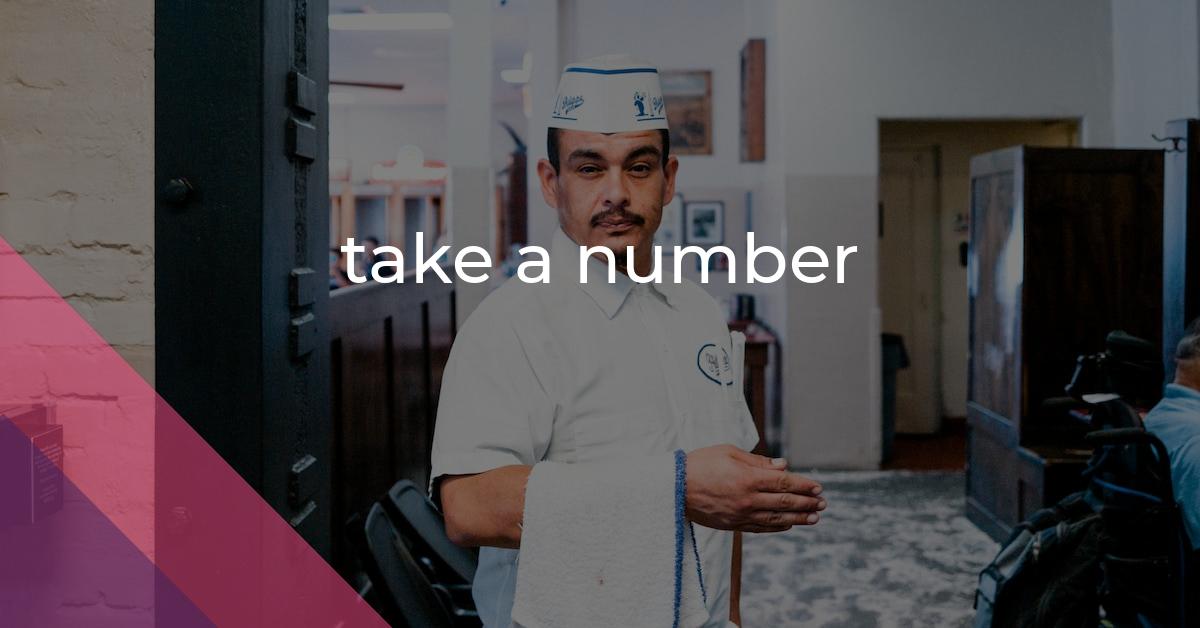take a number: Idiom Meaning and Origin
What does ‘take a number’ mean?
The idiom "take a number" means to wait in line or wait for one's turn. It implies that there are other people ahead and one needs to wait their turn patiently.

Idiom Explorer
The idiom "wait around" means to stay in a place, usually without a specific purpose, while expecting something to happen or someone to arrive.
The idiom "take a look" means to examine or observe something briefly or quickly.
The idiom "take a long walk on a short pier" means to go away and leave someone alone, usually because they are annoying or unwanted.
The idiom "take a gamble" means to take a risk or chance on something without being certain of the outcome.
The idiom "take a deep breath" means to pause, relax, and calm oneself before facing a challenging or stressful situation.
The idiom "take a breath" means to pause and relax, usually during a stressful or intense situation. It suggests the need to calm down, gather one's thoughts, or regain composure before continuing.
The idiom "take a bite" means to have a small taste or experience of something. It can also refer to accepting or dealing with the consequences of one's actions or decisions.
The idiom "take a back seat" means to take a less prominent or active role in a situation or to allow others to take the lead.
The idiom "step on it" means to hurry or accelerate, typically used as a command to someone to go faster.
The idiom "step forward" means to take the initiative or to offer oneself for a task or responsibility.
Deciphering the Enigma
"Take a number" is an idiom that originates from the practice of issuing sequential numbers to people in order to maintain order and fairness in waiting lines. This expression is commonly used in the United States and has become a part of everyday conversations, especially in situations where there is high demand and limited resources or services that need to be shared.
The concept of "take a number" is rooted in the system of managing queues and reducing the chaos associated with waiting in lines. This practice is believed to have emerged in the late 19th century when businesses and government institutions started implementing mechanisms to organize customer service. These mechanisms typically involve assigning a unique number to each individual or party, representing their position in the queue and indicating when it will be their turn to be attended to.
In its literal sense, "take a number" instructs individuals to approach a designated area, often marked by a dispenser or a sign, and obtain a numbered ticket or card. This number serves as a tangible representation of their place in line, allowing them to relax and wait comfortably without the need for physical presence or constant vigilance. As the numbers are called or displayed sequentially, individuals are prompted to proceed for the service they are waiting for.
The idiom "take a number" has gone beyond its literal meaning and is now used metaphorically to convey the need for patience or to express the idea that there is a predetermined order in which tasks or services will be provided. This idiom is often used in situations where individuals are vying for attention, assistance, or resources, emphasizing the idea that they must wait their turn and cannot expect immediate gratification. It is commonly heard in settings such as government offices, busy restaurants, healthcare facilities, and other places where a systematic approach to waiting is necessary.
The idiom "take a number" resonates with people because of its simplicity and effectiveness in encapsulating the shared experience of waiting and the anticipation it entails. It acknowledges the reality that time and attention are limited resources, and everyone must abide by a set order to ensure fairness and orderliness. By using this idiom, individuals can express their understanding of the need to be patient and their acceptance of the systematic nature of waiting in various aspects of life.
While the idiom "take a number" primarily implies conformity to the established order, it also carries subtle connotations of frustration or resignation. The phrase can signify a certain level of powerlessness as individuals place their fate in the hands of an impersonal system, often associated with bureaucracy. It draws attention to how societal norms and structures dictate waiting practices, leaving individuals to navigate the implications of their position in line and the potential uncertainties surrounding it.
The idiom "take a number" provides a glimpse into the intersection of everyday language and social dynamics. It highlights the importance of order and fairness in assigning meaning to waiting while also exposing underlying tensions between individuals' desire for immediacy and the obligations imposed by systematic processes. Understanding this idiom adds depth to our comprehension of the complexities and nuances that exist within seemingly mundane aspects of communication and human interaction.
The idiom "take a number" has become a prominent part of everyday conversations, conveying the need for patience and the recognition of a predetermined order in waiting for services or resources. It originated from the practice of assigning sequential numbers to individuals in order to manage queues effectively. Understanding this idiom provides insight into the complexities of waiting and highlights the balance between individual expectations and the necessity for order and fairness.
Example usage
Examples of how the idiom take a number can be used in a sentence:
- After arriving at the crowded hospital, the receptionist told the injured man to take a number and wait his turn to see the doctor.
- When calling a customer service hotline, it is common to hear an automated message asking you to take a number and stay on the line until your turn is reached.
- At the busy deli, the customers lined up and each one had to take a number from the dispenser before being served.
More "Waiting" idioms
We missed the mark - nothing found.



